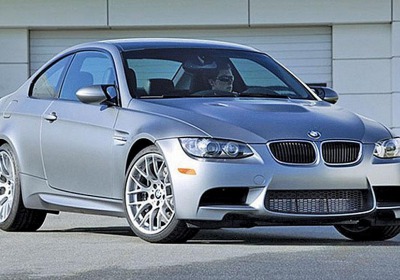BMW, Daimler experiment with upscale rent-by-the-ride
Fri, 24 Dec 2010
Two European luxury brands are tiptoeing into car sharing, a radical move for carmakers whose business for the past 100 years has been selling to individuals.
German archrivals Daimler AG and BMW AG have launched sharing programs. The automakers say the move was prompted by changing attitudes about car ownership, especially among young buyers, and increased urban congestion.
Daimler 's Car2go program is running in Austin, Texas, and Ulm, Germany. BMW has launched a one-year car sharing pilot in Munich.
Ian Robertson, BMW board member for sales and marketing, said the popularity of the Zipcar private car sharing program--especially among young people--sparked the automaker's interest.
Robertson said the car sharing phenomenon crosses age and income levels. And BMW already has a presence: Minis are part of the 5,000-plus Zipcar fleet in New York City.
BMW on Demand
BMW's car sharing pilot, called BMW on Demand, allows customers "to use various models at different times instead of being tied to one vehicle," the company said. The yearlong program launched this fall.
A driver can book a car in a specific color and trim level in person, on the Internet or by phone. Rates depend on the model and time of day.
For instance, a 1 series, BMW's entry car, costs 16 euros ($21.20) an hour; the 5 series is 23 euros ($30.49). Insurance, cleaning and servicing are included.
BMW said it will add a second site in Munich and may roll the program out to other European cities, but it didn't give a timetable.
Joachim Schmidt, head of marketing for Mercedes-Benz in Stuttgart, said 20,000 people are registered for the Car2go project in Ulm and 10,000 in Austin. Car2go uses only the Smart ForTwo minicar. Daimler is considering additional cities in the United States and Europe.
Schmidt said using an intelligent system with a transponder makes Car2go simple for users.
"You just drive from A to B where there is a parking space, the system calculates how long and how far, and your bank account will be debited," said Schmidt. "It is perfect for a Smart car."
The Smart can be driven outside Ulm or Austin but must be returned to special parking areas within the cities.
Schmidt said Mercedes is bidding on a system for Paris, which wants 3,000 cars for city workers. Peugeot is also interested. The city will award the contract by the end of the year.
Growing demand
The type of vehicle offered by a car sharing program doesn't matter much to users, said Mary-Beth Kellenberger, program manager of the global aftermarket for the Toronto-based consulting firm Frost & Sullivan.
"The majority of people using car sharing are looking for transportation," Kellenberger said. "The proportion of those people looking for specific type is very limited."
The most startling statistic is that every shared car means the loss of nine to 15 personally owned vehicles, says Frost & Sullivan. Typically, older individuals give up their personal cars or decide not to buy a replacement vehicle. Sometimes, the decision is triggered by the move into a condo that offers car sharing as part of the building package, said Kellenberger.
The other demographic group using car sharing is young people who don't have the money for a new car, she said. Or they move into a city and invest in real estate rather than an automobile.
Car2go grows
The Car2go project has 200 Smart ForTwos in Ulm and 210 in Austin, where a pilot with city workers began in November 2009. The Austin program was opened to the general public in May. More than 80,000 rentals have taken place this year, said Nicholas Cole, CEO of Car2go N.A., based in Austin.
Austin charges 35 cents per minute, $12 an hour or $65 for the day. Renters are liable for the first $1,000 of damage but don't pay for gasoline or insurance.
Car2go vehicles can be picked up within a 30-square-mile section of Austin called a "geofence." Cole said the area contains about 200,000 of Austin's 675,000 residents. Renters can drive outside the geofence but have to return cars within it at designated parking areas downtown or at a meter.
Vehicles can be reserved on the Internet or by using an iPhone with an application that shows where available cars are parked. The average rental time is 20 to 25 minutes, "but we see a lot of people using the cars for one hour or more," said Cole.
The cars are equipped with a telematics system that not only monitors their location but also how much fuel a vehicle has and whether the battery is fully charged. Each renter enters a PIN number and is asked to assess whether the car is clean or damaged. The cars all have fuel cards, and the user gets a 10 minute credit for refueling.
Cole said students and commuters who leave their vehicles at home are frequent users. The program has gotten accolades from Austin residents.
"It has created a lot of buzz," said Cole. "We are getting calls from different cities interested in what we are doing."
A decision on what cities will be added will be made in January, said Cole, declining to identify candidates.
A new production model called the Smart Car2go Edition--with a more sophisticated telematics system, solar roof and new hardware--was unveiled at the Paris auto show in October. The model will be used next spring in Hamburg, Germany, where Daimler is launching Car2go in a joint venture with the rental company Europcar Autovermietung GmbH. Cole hopes to get that model for Austin.
Cole doesn't think that adding larger Mercedes-Benz cars to the fleet is necessary--or even fitting for a program designed to help relieve urban congestion. He called Smart's Car2go "personal public transportation plus one--the model seems to fit perfectly."
By Diana T. Kurylko- Automotive News



